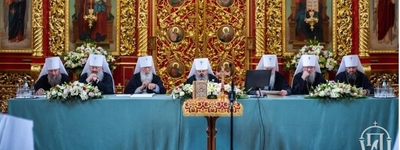Filaret in Washington: Prepared for Putin’s Provocations
If the Ecumenical Patriarchate recognizes the UOC-KP as a canonical Church …. the struggle between Moscow and Constantinople for primacy in the Orthodox world will end, and the church of Moscow will revert to its proper status as a daughter of the church of Kyiv.
Ukraine’s Orthodox can expect provocations from Russia’s Putin regime as they re-organize their church life and prepare for autocephaly. But they are prepared. Thus said Patriarch Filaret (Denysenko) of the Ukrainian Orthodox Church of the Kyivan Patriarchate (UOC-KP), speaking at the Atlantic Council in Washington, DC on September 19. He was introduced by former US ambassador to Ukraine John Herbst.
The Patriarch’s remark was in response to a question from a young Russian journalist who stated that during a recent trip to Ukraine, she had witnessed “Ukrainian nationalists” violently taking over churches belonging to the Ukrainian Orthodox Church of the Moscow Patriarchate (UOC-MP). She did not specify where this had taken place.
In reply, the 89-year-old patriarch cited the case of Ptycha, a village in Ukraine’s Rivne region, where ten “Cossacks” who supported the Moscow Patriarchate had started a major conflict, while two hundred faithful supported the UOC-KP. This, he said, was only one example among many. Moscow desires to start a religious war in Ukraine. But in the end, the supporters of an autocephalous Ukrainian Orthodox Church based in Kyiv, who vastly outnumber the adherents of the UOC-MP, will prevail.
Nevertheless, stressed the patriarch, ensuring the religious liberty and free choice of the people is more important than gaining parishes. Despite the provocations that are certain to come from Moscow, Ukraine will respect democracy, human rights, and the rule of law.
Filaret spoke at a moment when the Ecumenical Patriarchate had indicated that it would grant autocephaly to the Ukrainian Orthodox Church. On September 7, Ecumenical Patriarch Bartholomew appointed two exarchs to convoke a congress of Ukrainian Orthodox, which would choose its leader and petition Constantinople for autocephaly. The independent status of the Ukrainian Orthodox Church might be granted as early as October at an upcoming synod in Constantinople. Once that happens, Filaret said, some two-thirds of the adherents of the UOC-MP, even some in the occupied territory of the Donbas, would come over to the Kyivan Patriarchate. The remaining third, however, would remain equal in rights and free to continue their adherence to the Russian Church.
Regarding church property, Filaret noted that it belongs in some cases to the government, in others to the community. If two-thirds of the members of a parish vote to join either the Russian or the Ukrainian church, they can retain the property.
In view of his audience’s interests, Patriarch Filaret’s focus was political. Thus, for instance, he stressed the importance of obtaining autocephaly this year, in advance of Ukraine’s 2019 presidential elections. For Russia, he said, is planning to engineer the election of a pro-Russian president. Ukraine therefore needs US support.
While the state should not interfere in affairs of the Church, the patriarch pointed out that during his tenure at the World Council of Churches, that body had regularly discussed the same issues as the United Nations. The Church seeks peace. And peace means stopping aggression.
In response to a question from Ambassador Herbst, Patriarch Filaret stated that while the UOC-MP has 12,000 parishes compared to some 5,000 for the UOC-KP, 44% of Ukraine’s population supports the Kyivan Patriarchate, while only 16% supports the Moscow Patriarchate. If the Ecumenical Patriarchate recognizes the UOC-KP as a canonical Church, he predicted, the UOC-MP’s membership will be reduced by half. The struggle between Moscow and Constantinople for primacy in the Orthodox world will end, and the church of Moscow will revert to its proper status as a daughter of the church of Kyiv. This would finally bring peace to the Orthodox world.










